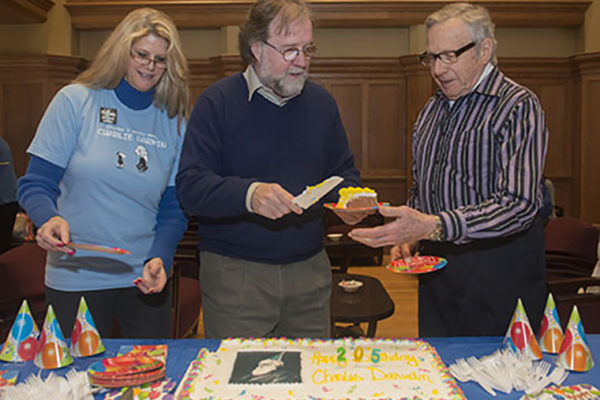‘Evo devo’ expert returns to campus
Sean B. Carroll, PhD (left), vice president for science education at Howard Hughes Medical Institute, a WUSTL alum (AB ’79) and one of the country’s foremost experts on evolutionary developmental biology, returned to campus to help the Institute for School Partnership celebrate its annual Darwin Day event for area high school teachers. Instrumental in Carroll’s appearance was mentor and teacher David Kirk, PhD (right), professor emeritus of biology in Arts & Sciences, who called Carroll one of the most “distinguished graduates in biology the department has had.”
MEDIA ADVISORY: Scholars gather in St. Louis to talk about ‘A Great City From the Start’
Scholars from across the nation will help kick off St. Louis’ 250th “Birthday Bash” weekend when they provide their perspectives on the city’s historical significance during a daylong symposium Friday, Feb. 14, at the Missouri History Museum in Forest Park. The symposium will be held from 9 a.m. until 5:30 p.m. in Lee Auditorium. The symposium luncheon will be held at Washington University in St. Louis.
Inspiring successful entrepreneurs and social innovators with the Suren G. Dutia and Jas K. Grewal Global Impact Award in the Skandalaris Center
A recent gift of $1,025,000 will establish the Suren G. Dutia and Jas K. Grewal Global Impact Award in the Skandalaris Center for Entrepreneurial Studies at Washington University. The endowed fund will receive $1 million, with the remaining $25,000 to support awards made during the current academic year. Applications are being accepted until March 24 for awards to support business ventures aimed at catalyzing social change.
WUSTL faculty receive Fulbright awards
Some WUSTL faculty members have received awards from the Fulbright Program for academic pursuits in areas ranging from architecture to education to medicine.
Students win international University Physics Competition
A WUSTL team learned last month that they had won the Gold Medal for their analysis of a problem during the international University Physics Competition, held in November. Using the principles of physics, they predicted characteristics of an animal on an extraterrestrial planet.
WUSTL student helps FDA roll out campaign to curb youth tobacco use
Daniel Giuffra, a freshman and Annika Rodriguez Scholar at Washington University in St. Louis, discussed his anti-smoking work as part of a recent U.S. Food and Drug Administration news conference announcing a new effort to curb tobacco use among at-risk youth.
National Book Award winner Mary Szybist
Incarnadine is a fleshy hue, a blushing, pinkish crimson, akin to salmon or rust or rose, the color of pale sunsets, of angels’ robes, of water stained by blood. But blue is the color that dominates “Incarnadine” (2013), Mary Szybist’s second collection: the blues of bright skies and dark oceans, of pretty dresses and ominous clouds, of feathers and bubbles and bruises long past healing.
Putting the squeeze on rocks
WUSTL geologist Philip Skemer has built a custom-made rock-formation appartus that traps a rock sample between tungsten carbide anvils about a
quarter inch in diameter within a 100-ton hydraulic press and then twists the sample slowly from below. His target pressure is six giga-pascals, the pressure 250 kilometers down, to
the base of the tectonic plates. He will use the apparatus to determine through experiment the mechanisms that lead mantle rocks to flow, dragging the tectonic plates with them.
‘Half the Sky’ author to explain how to turn oppression into opportunity for women worldwide for next Assembly Series
Pulitzer Prize-winning writer Sheryl WuDunn will present an Assembly Series address on “Half the Sky: Turning Oppression into Opportunity for Women Worldwide,” at 7 p.m. Tuesday, Feb. 11, in Graham Chapel on Washington University in St. Louis’ Danforth Campus. A booksigning will follow in the Women’s Building Formal Lounge. Both events are free and open to the public.
‘Otherwise: Mary Jo Bang & Buzz Spector’
Mary Jo Bang is a poet who, for most of her life, has secretly made visual art. Buzz Spector is a visual artist who, for most of his life, has sercretly made poetry. Now both reveal their secret practices with “Otherwise,” an exhibition on view through Feb. 8 at the Fort Condo Compound for the Arts.
View More Stories

